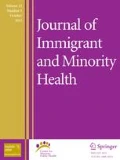Abstract
Depression is one of the most prevalent health problems for immigrants in the United States (U.S.) and it has been associated with the process of acculturation. A cross-sectional study was conducted to identify subgroups of Korean immigrant women based on their Korean as well as American acculturation levels using cluster analysis and to determine whether these subgroups differ on depressive symptoms in 200 Korean immigrant women aged 20–64. Cluster analysis identified four as the most appropriate number of subgroups: they were designated as Korean cluster (45%), Marginalized cluster (26%), American cluster (22%), and Bicultural cluster (7%). Korean cluster had high scores on Korean acculturation and low American acculturation, Marginalized had low for both, American had high scores on American acculturation, low for Korean acculturation, and Bicultural had high scores for both. Women in the Marginalized subgroup reported significantly higher depression scores than women in the American and Korean clusters. It is important to identify immigrants who do not relate to either their heritage culture or the new host culture and address their mental health risk issues.
Similar content being viewed by others
References
Miller AM, Sorokin O, Wang E, Feetham S, Choi M, Wilbur J. Acculturation, social alienation, and depressed mood in midlife women from the former Soviet Union. Res Nurs Health 2006;29(2):134–46.
Ryder AG, Alden LE, Paulhus DL. Is acculturation unidimensional or bidimensional? A head-to-head comparison in the prediction of personality, self-identity, and adjustment. J Pers Soc Psychol 2000;79(1):49–65.
Kuo WH. Prevalence of depression among Asian-Americans. J Nerv Ment Dis 1984;172(8):449–57.
Radloff LS. The CES-D scale: a self-report depression scale for research in the general population. Appl Psychol Meas 1977;1(3):385–401.
Cho MJ, Nam JJ, Suh GH. Prevalence of symptoms of depression in a nationwide sample of Korean adults. Psychiatry Res 1998;81(3):341–52.
Choi G. Acculturative stress, social support, and depression in Korean American families. In: Brown P, Shalett J, editors. Cross-cultural practice with couples and families. New York: Haworth Press; 1997. p. 81–97.
Shin KR. Factors predicting depression among Korean-American women in New York. Int J Nurs Stud 1993;30(5):415–423.
Berry JW. Conceptual approaches to acculturation. In: Chun K, Balls-Organista P, Marin G, editors. Acculturation: advances in theory, measurement and applied research. Washington, DC: APA Press; 2003. p. 17–37.
Chia A. A person-centred approach to identifying acculturation groups among Chinese Canadians. Int J Psychol 2006;41(5):397–412.
Pawliuk N. Acculturation style and psychological functioning in children of immigrants. Am J Orthopsych 1996;66(1):111–121.
Chia A. Understanding the multidimensionality of acculturation among Chinese Canadians. Can J Behav Sci 2006;38(4):311–324.
Szapocznik J. Theory and measurement of acculturation. Revista Interamericana de Psicología 1978;12(2):113–130.
Miller AM, Wang E, Szalacha L, Sorokin O, Fogg L. Longitudinal changes in acculturation for immigrant women from the former Soviet Union. Manuscript in review.
Berry JW, Kim U, Power S, Young M, Bujaki M. Acculturation attitudes in plural societies. Appl Psychol 1989;38(2):185–206.
Eyou ML. Cultural identity and psychological adjustment of adolescent Chinese immigrants in New Zealand. J Adolescence 2000;23(5):531–543.
Rudmin FW, Ahmadzadeh V. Psychometric critique of acculturation psychology: the case of iranian migrants in Norway. Scand J Psychol 2001;42(1):41–56.
Sanchez JI. Acculturative stress among hispanics: a bidimensional model of ethnic identification. J Appl Soc Psychol 1993;23(8):654–668.
Miller AM, Chandler PJ. Acculturation, resilience, and depression in midlife women from the former Soviet Union. Nurs Res 2002;51(1):26–32.
Cuellar I. Acculturation rating scale for Mexican Americans-II: a revision of the original ARSMA scale. Hisp J Behav Sci 1995;17(3):275–304.
Noh S, Kaspar V, Chen X. Measuring depression in Korean immigrants: assessing validity of the translated Korean version of CES-D scale. Cross-Cultural Res 1998;32:358–377.
Everitt BS, Landau S, Leese M. Cluster analysis. 4th ed. New York: Oxford University Press; 2001.
Milligan GW, Cooper MC. An examination of procedures for determining the number of clusters in a data set. Psychometrika 1985;50(2):159–179.
Abu-Rayya HM. Acculturation and well-being among Arab-European mixed-ethnic adolescents in Israel. J Adolescent Health 2006;39(5):745–51.
Author information
Authors and Affiliations
Corresponding author
Additional information
This paper is based on the first author's dissertation research at the University of Illinois at Chicago. A part of this paper was presented at the Annual Conference of Western Institute of Nursing, Portland, Oregon, April 2007. We thank Prof. Kathryn Lee for comments on earlier draft of this paper.
Rights and permissions
About this article
Cite this article
Choi, J., Miller, A. & Wilbur, J. Acculturation and Depressive Symptoms in Korean Immigrant Women. J Immigrant Minority Health 11, 13–19 (2009). https://doi.org/10.1007/s10903-007-9080-8
Received:
Accepted:
Published:
Issue Date:
DOI: https://doi.org/10.1007/s10903-007-9080-8


